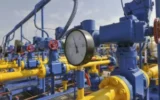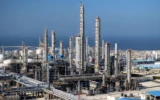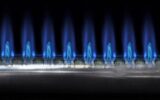
Gas consumption in the domestic, commercial, and small industrial sectors increased as temperatures dropped in the second week of December, reaching a peak of 530 million cubic meters on December 12, bringing total weekly consumption to more than 3.65 billion cubic meters.

The Integrated Planning Manager of the National Iranian Gas Company announced: "With timely major repairs, complete coordination of operational departments, and implementation of smart projects, the gas network has been fully prepared for the cold season."

A spokesman for the Tehran Provincial Gas Company announced the gas cutoff for the railway company and the issuance of a warning to the Ministry of Roads and Urban Development on the first day of implementing the special patrols plan for gas consumption management.

The National Iranian Gas Company and the School Renovation Organization signed a memorandum of understanding to replace high-efficiency heating systems and improve engine rooms; the main goal of this cooperation is to reduce energy consumption and optimally manage gas resources in the country's schools.

Saeed Tavakoli announced at the signing ceremony of the National Gas and Education Memorandum of Understanding: 850 million cubic meters of gas will be injected into the network daily; the country's schools will become a model for optimizing energy consumption with high-efficiency and smart power plants.

With the partial interruption of gas supply to Zagros Petrochemical Company, the company's second production unit was taken out of service on December 25, 2021, and its operations were suspended until the gas restrictions were lifted. At the same time, Mobin Energy, which provides utility services to the complex, announced that there had been a reduction in the consumption of some ancillary services, but this restriction will not have a significant impact on the company's EPS.

The Director of Energy Consumption Optimization at the National Petrochemical Company announced that the petrochemical industry has succeeded in saving 1.7 billion cubic meters of natural gas in the past four years by implementing optimization projects, and said: "Achieving annual savings of more than 200 million cubic meters has also been targeted for this year."

During the cold months of the year, 120 million cubic meters of gas are burned in Tehran daily, which results in the production of 270,000 tons of smoke and the destruction of 400,000 tons of oxygen in the air. Incomplete combustion of gas has led to the release of toxic and deadly CO gas and various diseases and silent deaths.

On the eve of winter and increased gas restrictions, the electricity industry has announced that only 14 power plants in the country are allowed to use diesel fuel, and this year, low-sulfur fuel has been made available to boiler units; a move aimed at reducing environmental concerns and ensuring a stable supply of electricity during the cold days of the year.

The CEO of the National Iranian Gas Company said: "The amount of gas delivered to power plants in November and the early days of December was much higher than the agreed plan."










